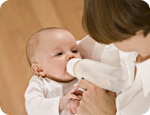
(NaturalNews) Our children’s brains and reproductive organs may be having their development harmed by an estrogen-like chemical that is present in plastic according to a federal health agency report. BPA is an ingredient in polycarbonate plastic. BPA is also one of the most widely used synthetic chemicals today. It has been shown to seep from hard plastic beverage containers (such as baby bottles) and even from liners in cans that contain food and infant formula.
The National Toxicology Program (part of the National Institutes of Health) has concluded that there is some concern that fetuses, babies and children are being harmed because bisphenol A (BPA) has been shown to harm animals at levels that are surprisingly low and found in nearly all humans.
The draft report followed an 18-month review that involved allegations of bias, disputes among scientists, and even the firing of a consulting company that had financial ties to the chemical industry.
Some scientists fear that BPA exposure early in life disrupts hormones and alters genes. This may program a fetus or child for breast or prostate cancer, may set them up for premature female puberty, and may lead to attention deficit disorders and other reproductive or neurological disorders.
This report reviewed about 500 laboratory animal experiments and concluded that there was “some concern” that fetuses, babies and children were at risk from BPA. It gave the rating “negligible” for concern for adults.
Not surprisingly, the plastics industry focused on the fact that the study found “no serious or high-level concerns.” They charge that the lab animal experiments are inconclusive and flawed. They went on to state that the limited evidence for effects in laboratory animals at low doses highlights opportunities for additional research to further understand whether these findings are significant to human health.
The advisory panel initially found “minimal” concern about the effects on the prostate and puberty after ruling with the plastics industry. They disqualified many animal studies that showed adverse effects. This drew criticism from the scientists who conducted the research.
In the new report, however, the National Toxicology Program overruled its panel. They elevated their findings about human prostates and puberty to the level of “some concern.” They also expressed concern about effects on human mammary glands which had not been previously addressed.
These findings reflect a significant scientific conclusion showing that BPA may play a larger role than previously thought in a variety of common health problems, including prostate cancer, breast cancer and early puberty.
Canada is expected to declare BPA a toxic substance in the very near future. This would be followed by proposals to control its use. California and other states are considering bans on BPA products.
The National Institute is the first government agency to conclude that low levels of BPA could be harming humans. Expect federal and state environmental agencies to utilize this study to develop policies governing its use. The National Toxicology Program will accept public comments on its draft report until May 23. It will then be reviewed by a new scientific panel in June.
About the author
Jo Hartley
Wife, Mother of 8, and Grandmother of 2
Jo is a 40 year old home educator who has always gravitated toward a natural approach to life. She enjoys learning as much as possible about just about anything!
http://www.loftymatters.com
Thursday, May 08, 2008
Source: Natural News
1 thought on “Chemicals in Plastic Shown to Cause Reproductive and Neurological Disorders”